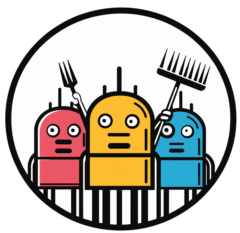The rapid advancements in artificial intelligence and robotics are transforming the nature of work and the economy. Tasks that once required human labour are now being automated at an accelerating pace, driving down the value of labour and creating profound economic challenges. If we do not adapt, these shifts could lead us to a dystopian society dominated by extreme inequality and neo-feudalism. However, there is a way forward: implementing a universal basic income (UBI) financed by taxing land, resources, and energy. This approach can ensure a fair distribution of wealth in a world where machines handle most of the production.
The Decline of Labour Value
Automation has already reshaped industries such as manufacturing, logistics, and customer service. AI is now encroaching on traditionally human-dominated fields like healthcare, law, and creative arts. The more these technologies improve, the more the cost of producing goods and services approaches zero, particularly for digital products or highly automated processes.
But this raises an important question: if robots and algorithms can produce everything from food to consumer goods to energy, what happens to the millions of people whose labour is no longer needed? Without intervention, many will find themselves excluded from the economy, as wages stagnate or disappear altogether.
Why Land and Resources Will Retain Value
In a world where digital goods are practically free, tangible resources will hold their value. Land is finite, and its utility for agriculture, energy production, and habitation ensures that it remains a key driver of wealth. Similarly, the extraction of raw materials and the generation of energy, even if automated, depend on physical locations and resources. Ownership of these assets will become the primary source of power and wealth, concentrating economic control in the hands of a few.
This concentration risks creating a new form of neo-feudalism, where landowners and resource holders wield disproportionate influence over society. Even if robots produce everything, access to the land where these robots operate will determine who benefits.
The Case for Universal Basic Income
To prevent such an outcome, we need to rethink how wealth is distributed. A universal basic income (UBI) funded by taxing land, resources, and energy offers a practical and equitable solution. Here’s why:
- Land and Resource Taxes Address Inequity: By taxing the value of land and resource use, society can capture the wealth generated by these finite assets, ensuring that their benefits are shared.
- UBI Ensures Economic Participation: A guaranteed income allows everyone to participate in the economy, even if their labour is no longer needed. This ensures a basic standard of living and supports the demand for goods and services.
- Encourages Innovation and Open Contributions: With basic needs met, people will be free to focus on pursuits that benefit society as a whole, such as developing Open Source projects, engaging in the arts, or tackling social and environmental challenges.
The Danger of Inaction
If we fail to implement such policies, the consequences could be dire. Without UBI, the majority of people will struggle to make a living, while a small elite controls the wealth generated by land, resources, and automation. This could lead to:
- Widespread poverty and inequality: With limited access to wealth, most people will be forced into precarious or underpaid roles.
- Social unrest: Economic exclusion could fuel resentment, protests, and political instability.
- Black markets and corruption: Attempts to bypass the official economy could undermine trust and fairness in society.
A Path Forward
The transition to a world dominated by AI and robotics doesn’t have to lead to dystopia. By taxing the finite resources that underpin the economy and redistributing wealth through UBI, we can create a society where everyone benefits from technological progress. This approach aligns incentives, ensures fairness, and supports human creativity and innovation in ways that the current system cannot.
Ultimately, the question is not whether we can afford to implement such changes, but whether we can afford not to. The choice is ours: adapt to this new reality or risk a future of inequality and social decay.
